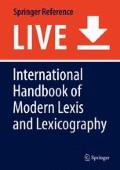Abstract
It is tempting to dismiss crowdsourcing as a largely trivial recent development which has nothing useful to contribute to serious lexicography. This temptation should be resisted. When applied to dictionary-making, the broad term “crowdsourcing” in fact describes a range of distinct methods for creating or gathering linguistic data. A provisional typology is proposed, distinguishing three approaches which are often lumped under the heading “crowdsourcing.” These are: user-generated content (UGC), the wiki model, and what is referred to here as “crowd-sourcing proper.” Each approach is explained, and examples are given of their applications in linguistic and lexicographic projects. The main argument of this chapter is that each of these methods – if properly understood and carefully managed – has significant potential for lexicography. The strengths and weaknesses of each model are identified, and suggestions are made for exploiting them in order to facilitate or enhance different operations within the process of developing descriptions of language. Crowdsourcing – in its various forms – should be seen as an opportunity rather than as a threat or diversion.
References
Atkins, B. T. S., & Rundell, M. (2008). The Oxford guide to practical lexicography. New York: Oxford University Press.
Benedictus, L. (2014). The Urban Dictionary guide to sex: Mopeds, porb and awkward arms. The Guardian, March 18, 2014. http://www.theguardian.com/lifeandstyle/2014/mar/18/urban-dictionary-sex-moped-porb-awkward-arm-sexual-slang?CMP=twt_gu
Brabham, D. C. (2008). Crowdsourcing as a model for problem solving. The International Journal of Research into New Media Technologies, 14(1), 75–90.
Casebourne, I., Davies, C., Fernandes, M., & Norman, N. (2012). Assessing the accuracy and quality of Wikipedia entries compared to popular online encyclopaedias: A comparative preliminary study across disciplines in English, Spanish and Arabic. Epic. Brighton, UK. Retrieved from http://commons.wikimedia.org/wiki/File:EPIC_Oxford_report.pdf
Creese, S. (2013). Exploring the relationship between language change and dictionary: Compilation in the age of the collaborative dictionary. In I. Kosem, J. Kallas, P. Gantar, S. Krek, M. Langemets, & M. Tuulik, (Eds.), Electronic lexicography in the 21st century: Thinking outside the paper. Proceedings of the eLex 2013 conference, Tallinn, Estonia (pp. 392–406). Ljubljana/Tallinn: Trojina, Institute for Applied Slovene Studies/Eesti Keele Instituut.
Giles, J. (2005). Special Report: Internet encyclopaedias go head to head. Nature, 438, 900–901.
Green, J. (2012). Dictionaries are not democratic. The Guardian, September 13, 2012. http://www.theguardian.com/books/booksblog/2012/sep/13/dictionaries-democratic-crowdsourcing
Greene, R. L. (2014). Internet lexicography: A, you’re adorkable. The Economist, May 22, 2014. http://www.economist.com/blogs/prospero/2014/05/internet-lexicography
Hanks, P. (1998). Enthusiasm and condescension. In T. Fontenelle, P. Hiligsmann, A. Michiels, A. Moulin, & S. Theissen (Eds.), Proceedings of the 8th EURALEX international congress (pp. 151–166). Liege: English and Dutch Departments, University of Liège.
Hanks, P. (2012). Corpus evidence and electronic lexicography. In S. Granger & M. Paquot (Eds.), Electronic lexicography (pp. 57–82). Oxford: Oxford University Press.
Higby, D. (2013). Tapping the brain for words. Macmillan Dictionary Blog, August 27, 2013. http://www.macmillandictionaryblog.com/tapping-the-brain-for-words
Kilgarriff, A., Husák, M., McAdam, K., Rundell, M., & Rychlý, P. (2008). GDEX: Automatically finding good dictionary examples in a corpus. In E. Bernal & J. DeCesaris (Eds.), Proceedings of the XIII EURALEX international congress (pp. 425–433). Barcelona: Universitat Pompeu Fabra.
Kosem, I., Gantar, P., & Krek, S. (2013). Automation of lexicographic work: An opportunity for both lexicographers and crowd-sourcing. In I. Kosem, J. Kallas, P. Gantar, S. Krek, M. Langemets, & M. Tuulik, (Eds.), Electronic lexicography in the 21st century: Thinking outside the paper. Proceedings of the eLex 2013 conference, Tallinn, Estonia (pp. 32–48). Ljubljana/Tallinn: Trojina, Institute for Applied Slovene. Studies/Eesti Keele Instituut.
Lew, R. (2014). User-generated content (UGC) in English online dictionaries. OPAL: Online publizierte Arbeiten zur Linguistik. Institut für Deutsche Sprache. 4/2014, 8–26.
Meyer, C., & Gurevych, I. (2012). Wiktionary: A new rival for expert-built lexicons? Exploring the possibilities of collaborative lexicography. In S. Granger & M. Paquot (Eds.), Electronic lexicography (pp. 259–292). Oxford: Oxford University Press.
Pearsall, J. (2013). The future of dictionaries. Kernerman Dictionary News, 21(July 2013), 2–4.
Poesio, M., Chamberlain, J., Kruschwitz, U., Robaldo, L., & Ducceschi, L. (2010). Phrase detectives: Utilizing collective intelligence for internet-scale language resource creation. ACM Transactions on Embedded Computing Systems, 9(4), 39.
Rundell, M. (2014). What goes in the dictionary when the dictionary is online? Macmillan Dictionary Blog, July 15, 2014. http://www.macmillandictionaryblog.com/what-goes-in-the-dictionary-when-the-dictionary-is-online
Rundell, M., & Kilgarriff, A. (2011). Automating the creation of dictionaries: Where will it all end? In F. Meunier, S. De Cock, G. Gilquin, & M. Paquot (Eds.), A taste for corpora. A tribute to Professor Sylviane granger (pp. 257–281). Amsterdam: John Benjamins.
Dictionaries
CED Collins English Dictionary. http://www.collinsdictionary.com/dictionary/english
LDOCE Longman Dictionary of Contemporary English. http://www.ldoceonline.com
MED Macmillan Dictionary. http://www.macmillandictionary.com
MOD Macmillan Open Dictionary. http://www.macmillandictionary.com/open-dictionary/
MW Merriam-Webster online. http://www.merriam-webster.com
ODE Oxford Dictionaries Online: English. http://www.oxforddictionaries.com
UD Urban Dictionary. http://www.urbandictionary.com
Wordnik. https://www.wordnik.com
Author information
Authors and Affiliations
Corresponding author
Editor information
Editors and Affiliations
Rights and permissions
Copyright information
© 2017 Springer-Verlag GmbH Germany
About this entry
Cite this entry
Rundell, M. (2017). Dictionaries and crowdsourcing, wikis and user-generated content. In: Hanks, P., de Schryver, GM. (eds) International Handbook of Modern Lexis and Lexicography. Springer, Berlin, Heidelberg. https://doi.org/10.1007/978-3-642-45369-4_26-1
Download citation
DOI: https://doi.org/10.1007/978-3-642-45369-4_26-1
Received:
Accepted:
Published:
Publisher Name: Springer, Berlin, Heidelberg
Online ISBN: 978-3-642-45369-4
eBook Packages: Springer Reference Social SciencesReference Module Humanities and Social SciencesReference Module Business, Economics and Social Sciences

